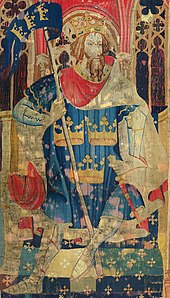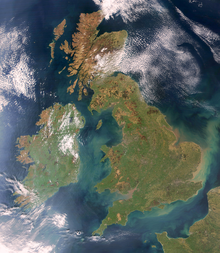| Revision as of 21:57, 13 March 2017 edit84.78.18.250 (talk)No edit summaryTags: Mobile edit Mobile web edit← Previous edit |
Revision as of 21:59, 13 March 2017 edit undo84.78.18.250 (talk)No edit summaryTags: Mobile edit Mobile web editNext edit → |
| Line 1: |
Line 1: |
|
] of the United Kingdom, adopted in this version in 1801 bearing the England's red cross with white border (England in 1801 included Wales within it), Ireland's Saint Patrick's Saltire with a white border, and Scotland's Saint Andrew's Saltire and blue background. This is a common symbol used by British nationalists.]] |
|
] of the United Kingdom, adopted in this version in 1801 bearing the England's red cross with white border (England in 1801 included Wales within it), Ireland's Saint Patrick's Saltire with a white border, and Scotland's Saint Andrew's Saltire and blue background. This is a common symbol used by British nationalists.]] |
|
] became the first monarch of ] and ]]] |
|
] became the first monarch of ] and ]]] |
|
], the king of the ancient ], depicted as one of the ] in tapestry, c. 1385. The legend of King Arthur as a warrior ruler and British hero as depicted by ] in '']'' laid the foundation of British nationalism.]] |
|
], the king of the ancient ], depicted as one of the ] in tapestry, c. 1385. The legend of King Arthur as a warrior ruler and ] hero as depicted by ] in '']'' laid the foundation of British nationalism.]] |
|
] and ].]] |
|
]. British nationalism typically focuses on the unity of ] and ].]] |
|
'''British nationalism''' asserts that the ] are a ] and promotes the cultural unity of the British,{{sfn|Motyl|2001|pp=62-63}}<ref name="Guntram H. Herb 2008">Guntram H. Herb, David H. Kaplan. Nations and Nationalism: A Global Historical Overview: A Global Historical Overview. Santa Barbara, California, USA: ABC-CLIO, 2008.</ref> in a definition of ] that may include people of ], ], ], ] and ] descent.{{sfn|Motyl|2001|pp=62-64}} British nationalism is closely associated with ], which seeks to uphold the political union that is the ], or strengthen the links between the countries of the United Kingdom.<ref name="Mil133">{{harvnb|Miller|2005|p=133}}.</ref> |
|
'''British nationalism''' asserts that the ] are a ] and promotes the cultural unity of the British,{{sfn|Motyl|2001|pp=62-63}}<ref name="Guntram H. Herb 2008">Guntram H. Herb, David H. Kaplan. Nations and Nationalism: A Global Historical Overview: A Global Historical Overview. Santa Barbara, California, USA: ABC-CLIO, 2008.</ref> in a definition of ] that may include people of ], ], ], ] and ] descent.{{sfn|Motyl|2001|pp=62-64}} British nationalism is closely associated with ], which seeks to uphold the political union that is the ], or strengthen the links between the countries of the United Kingdom.<ref name="Mil133">{{harvnb|Miller|2005|p=133}}.</ref> |
|
|
|
|
It is characterised as a "powerful but ambivalent force in British politics". In its moderate form, British nationalism has been a civic nationalism, emphasizing both cohesion and diversity of the people of the United Kingdom, its dependencies, and its former colonies. Recently however, nativist nationalism has arisen based on fear of Britain being swamped by immigrants; this anti-immigrant nativist nationalism has manifested politically in the British National Party and other nativist nationalist movements. Politicians, such as former British Prime Minister David Cameron of the Conservative Party, have sought to promote British nationalism as a progressive cause.



